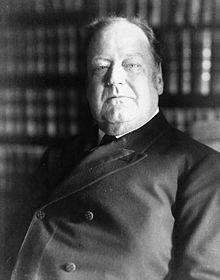Edward Douglass White Junior
Edward Douglass White Jr. (* 3. November 1845 in Lafourche Parish , Louisiana ; † 19th May 1921 in Washington, DC ) was an American politician ( Democratic Party ) and from 1910 until his death judge at the Supreme Court of the United States .
Early years
White was born in southern Louisiana in 1845. His family ran a large cane sugar plantation with an attached refinery there . Among his ancestors were a US marshal, congressman, and lawyer. His father Edward Douglass White Sr. was a former governor of Louisiana and his grandfather was Congress delegate James White . After school he attended Georgetown University in Washington. His studies were interrupted by the outbreak of the American Civil War. He returned to Louisiana; however, where he was during the war is unclear. The Civil War records only record that he was taken prisoner of war in Louisiana in March 1865 and was interned in New Orleans until April . These files identify him as a lieutenant in a cavalry regiment . At the time of his appeal to the Supreme Court , however, it was common knowledge that he was an officer in the Southern Army .
After the war he retired to the now abandoned and ownerless plantation and began studying law. After his admission to the bar , he settled in New Orleans in 1868. In the meantime, he served briefly in the Louisiana Senate (1870) and at the state's highest court (1879-1880). At the time he was on good terms with Governor Francis T. Nicholls . With his help in the prohibition of the Louisiana lottery (a corrupt game of chance) he achieved a high profile in his home state.
politics
White represented his state as a senator in the US Congress in Washington from 1891 . He held this office until his resignation on March 12, 1894. On that day he was appointed by President Grover Cleveland as a judge at the US Supreme Court . After the death of Chief Justice Melville W. Fuller in 1910, President William Howard Taft appointed him to succeed him. That came as a surprise because no one expected Republican Taft to propose a Democrat for that post. To this day there is speculation about Taft's reasons. Some historians believe it is possible that Taft only appointed the 65-year-old because he was hoping for a short term from White so that he could later take over the office himself. This is exactly what happened in 1921 after White's death. As the chief federal judge, White was rather conservative and inconspicuous. There were few spectacular judgments during his tenure. In 1916 he declared the eight-hour day for railroad workers to be constitutional ( Adamson Act ). During his tenure, Presidents Woodrow Wilson and Warren G. Harding were inaugurated .
family
White had been married to Leita Montgomery Kent since 1894. He died on May 19, 1921 and was buried in Oak Hill Cemetery in Washington.
Web links
- Edward Douglass White in the Biographical Directory of the United States Congress (English)
- Supreme Court Historical Society biography
- Edward Douglass White Jr. in the database of Find a Grave (English)
See also
| personal data | |
|---|---|
| SURNAME | White, Edward Douglass Jr. |
| ALTERNATIVE NAMES | White, Edward Douglass |
| BRIEF DESCRIPTION | American Senator, United States Federal Judge |
| DATE OF BIRTH | November 3, 1845 |
| PLACE OF BIRTH | Lafourche Parish , Louisiana |
| DATE OF DEATH | May 19, 1921 |
| Place of death | Washington, DC |



